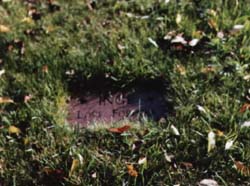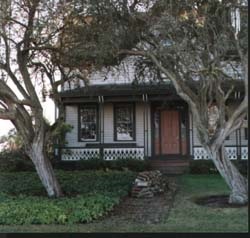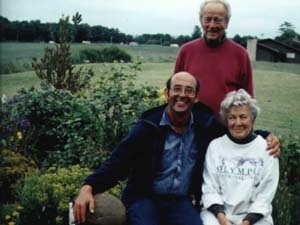|
|

|
"Fuzzy"
I had told Leo. He responded in the passionate opposite and I still
fail to find the words he used that complimented the designer.
Communications, I have learned can be tricky things. I meant something
else, but fuzzy was the word I chose to use. My mind was trying to
convey that my eyes were constantly being challenged by this garden,
perplexed sometimes, captivated always.
Sometimes even blocked by unexpected summer outcroppings, like these
south facing Calendulas. Oranges, so strong, so bright, so intense,
they are the pumpkin maitre' d, the stop signs to this visit, pushing
us to redirect our footsteps. Perhaps, this is their purpose.
Cholerics, with a sense of humor, they invite us to look at things
differently. We laugh, and then return to pathways more intimate, more
proper. |
Magic is found in the interplay of softer tones.
The eye prefers to travel like the bee, flitting from one form, one
color to another, gathering the tasting of blossoms that invite
harmony. A drowning in this late September light that falls honey-like
and amber warm, like a swarming of autumn leaves upon a garden that
invites a shifting of light.
Fall brings the realization that many garden
goals may not be met before winter snows. Bita says, "You don't carry
over. You don't get so smart that you outsmart yourself, even by
carrying over something that was successful. Because then, you're not
really looking at where you are, and that is new involvement. That is
what growing older means."
"Going through life is a flow of various stages. Each one builds on the
other with no lament that you don't have that which looked so
beautiful, and Oh, I wish I still had that. You enjoyed it. Listen,
Herb, This Is Really Important!"
Fall shifts focus. Even as winter approaches, there is no easy
surrender. Even now Calendulas and Cosmos give forth a fiery blaze that
challenges the autumn bite of Parrotia's and Enkianthus that see red.
The leaves, linger, yet slowly yield to the approach of their destiny.
Deprived of green, show their true colors, "they more or less loosen
from within. And, only in the fall can we glimpse the full growth of
the branches ... growth hidden by
the leaves of summer."
"Growth is okay. Change is okay. Like the fall
surrendering to winter, one moves with these cycles -- if it changes,
you say, Wow, look at that' then slide along with it, if you can. Those
are the big pluses." Bita never forgets to tell herself, "It's the
learning that's important. You can't take it with you." She once told
me, that if I remove all those things that don't please me, or don't
fit quite right now, I'm negating everything. "I will never get to see
what maturity does. What the relationships are. Too often, the minute
it gets too big to the eye, we take it out. That's not the idea."
Old gardens that survive have done so because
they are hard-worked gardens, and differences may yet arise, blendings
that mesh with each other slowly and more subtly. Plants that may
appear delicate, but were chosen well, and hold firmly in all the wind
and rains that visit this Northwest corner. They say to the coming
winter of ice and snow. I am stronger than I look! I am also hard work.
When Alton and Bita first saw this garden,
"Everything was weeds ... there were seed pods everywhere. That is when
she knew that this was a garden of considerable richness. That's what
made me do it" She had seen the work, and remembered saying, "Don't do
it. It's too much!" She told me that was hard for her to admit. "But
when I saw the richness from all these seedpods and all these things
going on I said to myself, you cannot come in with any kind of weed
killers, because, you will never know some of the things yet to come
up." And that is the wholeness, the enduring legacy of this garden.
This philosophy nurtures their garden. New things
are born every year (legacies of the heart) surprises that were not
there the year before. What do these plants do? When do they decide its
time to make a re-appearance? Some of it speaks to love and to daring.
It also speaks to the warmth of May, for in spring as in summer there
fell many chance seedlings. They moved on and took root in the most
unexpected of corners.
A friend writes, "Why do they
stray to locations where the sun is more hostile?" Birthings are easy,
but they can easily be lost or misplaced in life. "The gardener with a
heart finds them; lifts them gently up -- always careful to try to find
them a better place. Hearts that feel pity when these plants can't hide
from the sun." (Written by a lady with the name of Shade.) Sometimes,
they adapt and prove a surprise to one and all. Often, they survive,
and in that adapting pass on a new hardiness to seedlings yet to come.
Are they melancholics reaching out to the sun -- to their brighter
fulfillment -- can we ever know?
Perhaps life's seedlings need this testing. Bita
loves Gaultherias and grows a great many of them. She challenges them.
"Basically they don't like full sun, they really need some shade, but I
would plant them North, South, East, West in all kinds of different
locations. It was surprising how some just sort of existed and others
increased richly, and I got the greatest joy out of finding that out."
"You see, that's experimentation and that's not going along with the
prescribed rules." The here is where it shoud be'ums.
Her whole garden holds surprises, combinations and placements I would
never have tried.
Placements are too often made of patterns
captured from books rather than from the gardeners own sorcerer's
trowel, or natures own. Sometimes a plant just needs a walking around
the corner, to moister soil’s, or climate zones lapping over
themselves. It is in these magical happenings that we find newborn
forms, not of one or the other. 'Speciation's.' as Bita says.
"You bet there will be surprises, one cannot even be
certain how different plants will react with others." It's like people,
I can handle you singly, like this, but I don't know if I could handle
you in a crowed. I might think GEE, get out of the way. You’re messing
up the whole thing! This is the same in a garden. You think you know
your plants. Basically you know variations of species and different
forms. But when you intermingle with the other plants, then they're not
doing what you think they should be doing.
|
|

And that's where you get into the whole
thing ... (I impolitely interrupt with) "Who you would invite
into your garden -- was this a hint?" I remember bouncing
into one of her summer afternoons. She was on her porch, and she turned
to close the door. "To keep the varmints out."
The arrival of a new creation does not always fit comfortably.
Sometimes though, we take notice. The miniature conifer, Abies
lasiocarpa 'Duflon,' discovered by Alton and Bita, high in the
Olympics, is now propagated and nestled securely in this seaside
garden. Its own children are housed in many other gardens, thanks to
the keen eyes and observing hearts of these two people. Thanks as well
to Ed Lohbrunner who took cuttings from their plant. He took five. All
rooted! That winter the parent plant died. These are the miracles the
Steward above bestows upon those who care.
Like the two Hawthorns, Bita and Alton have managed to infuse their own
thread of green, to this garden, to a history they are now part of.
They always knew it would not come easily, or quickly, but these two
are of an older generation, willing to work hard and to invest their
souls fully.
Alton, told me, "Like Bita, I enjoy the garden because of the plants I
work with -- that I talk to-- and get answers to even." He went on to
say that he couldn't think of an example where he’s seen Bita unhappy
in the garden, "Even when she's not feeling very well. The garden is
her tonic." I felt that too, but from a different view. The late 80's
were quite dark for me, and I told them that there were times I might
have died, if it hadn't been for my plants. It was like they were
saying, 'We need you to keep us alive,' but all the time, I was sucking
their green juices into me, and they were keeping me alive!
Bita knew me then and commented that she
had hoped that I could work out of it, because that negativity does not
go with gardening. Gardeners, no matter how thick or deep the glumming
might
be, should be able to overcome it sufficiently to get back into the
garden and give it another chance. "It is the same with most musicians
and artists. Even when unhappy or suffering, they were not unhappy to
work, not unhappy to work with their tools, and let their energies,
their sadness out. For theirs too is a struggle to communicate. Too
often they are compared to others, looked at and heard with a critical
and comparing eye and ear rather than enjoyed.
In knowing these two, I have become part of
this garden. They have encouraged this younger hawthorn to get moving.
"Hey, I'm part of a garden now. I've got to get going now! I've got to
get going here -- I can't stay spindly like I was." Gardens are not
meant to be autobiographies to self-importance, nor solitudes as
escapes from realities. Gardens can be hard cutting beds, sometimes
meant to birth new challenges. The rewards -- the gifts -- are Wonderment,
and finding oneself, a little bit at a time. A firmer grounding in this
reciprocal creation, a seeding of nurturings that return ... when
finally, we too mature as fully as our garden, the achievement of
knowing our heart as well as our garden.
We don't always know why someone
turns on to a garden, be it just a little corner, or the whole.
Some visitors like Leo may choose to use few words but in their silence
they have absorbed what these two have created. Gardens like theirs do
no come easy, affirmations, not for egos, nor derived for results, but
simply for "the workability of a beautiful thing ... a garden with
plants."
Lessons, of investments and free giving
movements that two dissimilar people can give each other; like their
garden they are of hard and enduring construction. Their spirit, their
mix will endure. Today as I exit this garden I know that someone 140
years from now will see what they have done and be touched by it as
well. Not a bad answer to... "Did you get what you came down here for?"
Bita and Alton, might just be able to say
"Ya, I think we did!"
The spirit may change as the years flow by. They have talked of this,
and Bita said, "That probably the most important things you can cherish
are change and discovery. We build up the years, hopefully, of learning
and experience. Now you should be able to handle the changes and the
best out of them. I asked -- Even the hard changes? "Even
the hard changes -- you bet! You don't have a second chance."
As this late September cools, I walk in
fog- wraithed grasses and feel a chill suspended in the air, a warning
of winter soon to come. The fog is a feminine prescience that wraps her
slender fingers around this house, over this garden, into my soul. A
possessiveness waiting to put this garden to rest, fall's alchemy of
light has begun to fade.
The summer of deadheading is over. The fuss
abandoned under the drift of autumn leaves. This garden-in-fall invites
new revelations. It has a soul born of movement, like the elementals
wind and sea.
Sunlight surrenders to
a leonine tawnyness, a stretching somnolence that is tasted. The plants
feel it, as do I -- warning triggers, that this 'greening' needs a
rest. This evening's hoarfrost forebodes winter and Northern Spirits
ready to avalanche their way south.

The sky has turned from plum, to a black flannel darkness that seeks
the warmer blood of these earlier seasons. As I walk away from this
Gothic home I catch glimpse of another reflection. That this season of
hibernation finds itself unable to reach the magic of these strong
summer roots, that reach deeply into an earth well nourished and
lovingly maintained. Raw material to fashion new seasons, new hopes,
new forms new paths. Molded by hard worked hands, and legacy to strong
investment
|
|
SUMMER
PRUNING
Bita’s garden was summer pruned, like the Enkianthus, revealing torsos
and shapes Leo and I never knew they had. This woman knows how to seek
out these hidden souls. Hard honest pruning, (be they of shears, or of
words) are necessary tools in this summer of exuberance. The hawthorns
survived the elemental winds because they were never allowed to get too
bushy or thick, so they would blow over. I questioned the
seeming lack of perennial under planting. They're lonely.
Only bulbs and natives were planted, for "to plant things that have to
have water would get them too excited, would get them growing. They
would get too heavy, too out of scale, too vulnerable to the wind."
This is why we are friends. Bita prunes well, gardens hard, and by her
pruning, new forms are given birth. The gift is in the knowing of the
proper time, early enough for second growth to harden off fully and
provide protection against winter’s cold. Nature teaches gardens to
hold on tightly to life. Bita's actions teach that sometimes we have to
be ruthless in warmer seasons that may still be bringing flowers. Late
summer prunings stimulate the underlying roots to delve more deeply
into the soil. They provide a strong lesson to the rest of us who would
walk into this winter season unprepared.
Sometimes we ignore, or simply don't catch up to the things we really
need to be doing. It may just be the normal catch basin of daily
living, to the job, to the other responsibilities. Always to others! We
need the distancing we can find in the garden.... to catch up with
ourselves. Back to the hawthorns. I always liked to think that the one
on the right burried a bit ahead, wanting to pull the other to enter
before the seasons ends.
|

|
Leo
noticed what I might have overlooked ... He paused for the longest time
between the two pear trees standing before the house, tall and
straight, like guardian spirits. "What's this," he asked looking down
at a small grave marker centered perfectly between. The chiseled
inscription read 'Inge Love forever,' and there were flowers placed on
that stone. |
I think these where the flowers he admired most. I explained that it
was the grave of their best friend's dog. Leo said nothing, but in that
moment he understood the owners of this home better than
I who had visited on the day they buried Inge. In familiarity, I would
have walked on by. Leo traveled with an unhurried and different eye,
expecting nothing, thereby seeing things I did not.
Sharing places with friends whose eyes are open to different windows is
a special adventure. Like Bita and Alton who helped wake new horizons,
new depths and perceptions in my soul, good gardens are the foundations
of new relationships -- sometimes our own.
I told Bita that I may yet go in any direction. She replied, "You may
go in several directions if you meet a strong enough person." ... and
there I am.
Schnörtel
- as opposed to snorkel. German for ornaments, flourishes. I
always mispronounced it as Schnörkel.
(The McAlmond
House was built in 1861 by Captain Elijah H. McAlmond. The house stands
on the bluffs of Dungeness near Sequim, WA.. The home remained in the
McAlmond family until the mid 1900s, when the last remaining property
was put up for sale. Bita and Alton Duflone were the last caregivers of
the property and passed away just a few years ago. The McAlmond House is on
the Washington State Register of Historic Places. and is now up for
sale.)
© Bindweed/ Herbert Senft -- January 1994 Not to be distributed without
the author's
permission.
|
|
|
|




